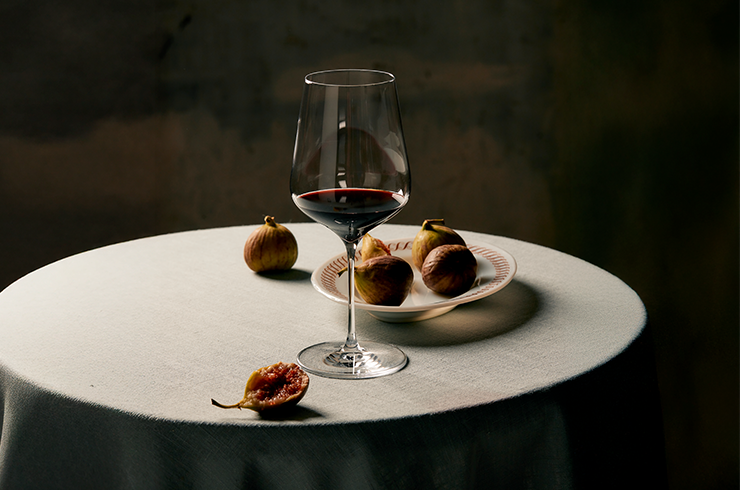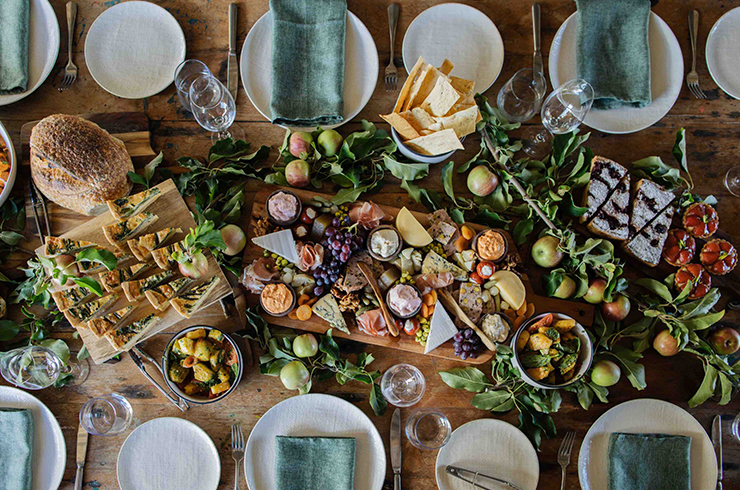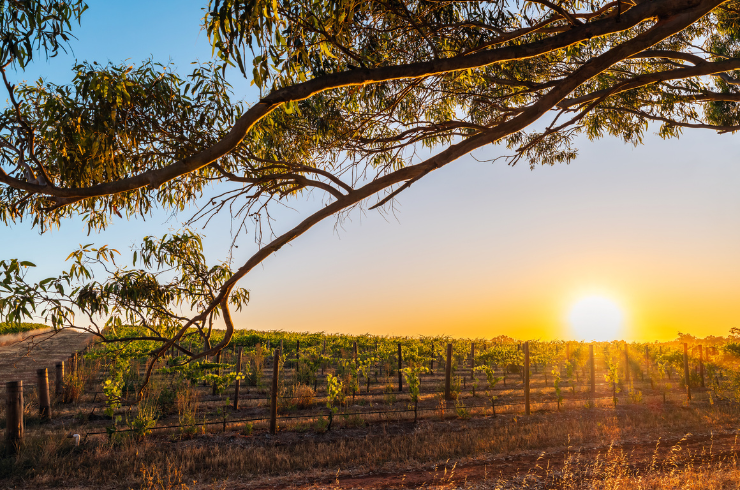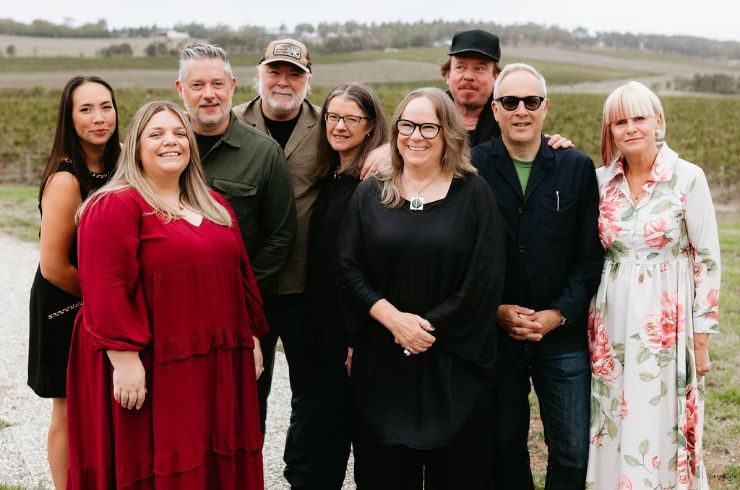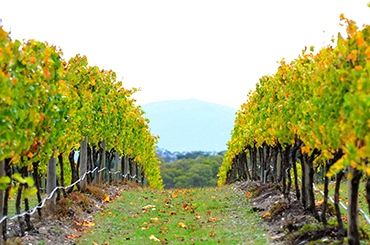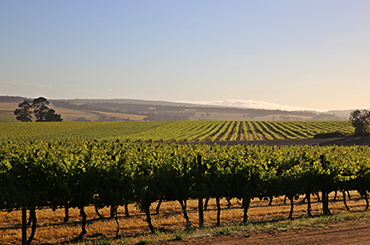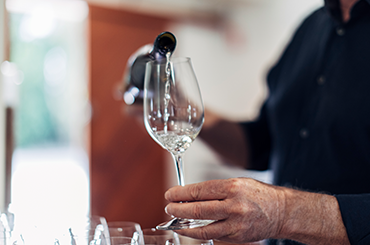Ten years of competitive rowing is an unlikely background for a viticulturist, but Hannah McKay of Tasmania’s Pooley Wines can join the dots. “It means I have broad shoulders and strong thighs, which helps me in farming,” she says. “And you need perseverance, so the mentality of being an athlete and having to push yourself through definitely helps on those less-than-perfect days. My motto was always ‘don’t think about it, just do it’.”
After rowing throughout her Sydney schooling and representing New South Wales on the state youth team, Hannah took a scholarship to the University of Miami, a top US sports college, where she studied business management. “I had big aspirations with rowing, but I had a few surgeries – my wrist had a pretty bad time,” she says.
After post-college stints in Norway and Prague, Hannah found herself back in Sydney working in finance at an aviation and defence consulting firm, but she soon tired of the office life.
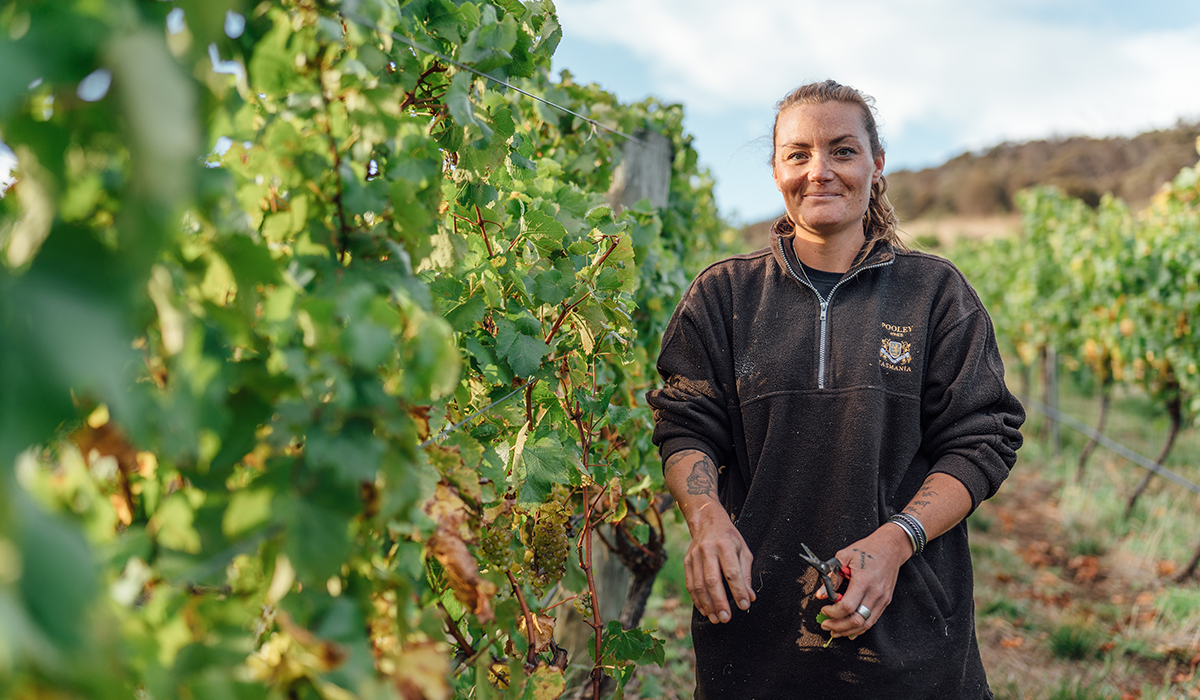
“I was never satisfied with my work, so I knew I had to do something else,” she says. Around this time, Hannah was escaping on weekends to her grandparents’ farm in the Southern Highlands, where she tended to a large vegetable patch. Before long, she had enrolled in viticulture at Charles Sturt University, which is an online course. “I’m very much a green thumb, so I was originally thinking of going into horticulture. But I love wine and thought the industry might make more of my business degree. Plus, I think the science behind grape vines is so resilient, and the end product is obviously very enjoyable!”
Immediately falling in love with viticulture, Hannah left her Sydney job to start her own business in the Southern Highlands, where she took on work pruning, shoot thinning, wire lifting and more in the local vineyards, as well as working in cellar doors to better understand wine. “It was horrible at first – it snowed in my first season – but I went home every day feeling satisfied,” she recalls. “My body hurt, but having that visual feedback from your work was very fulfilling. I realised vines were so clever.”
For her first full-time viticulture role, Hannah landed the plum gig of vineyard supervisor at Margaret River’s Vasse Felix. She spent more than three years at the esteemed winery learning alongside some of the best while completing her degree. But with her parents based in Launceston and a long family history in Tasmania, Hannah was drawn to Pooley Wines when their vineyard manager role came up. She flew down to meet the team at the end of 2019 and moved across in February 2020. “It all fell into place really well,” she says.
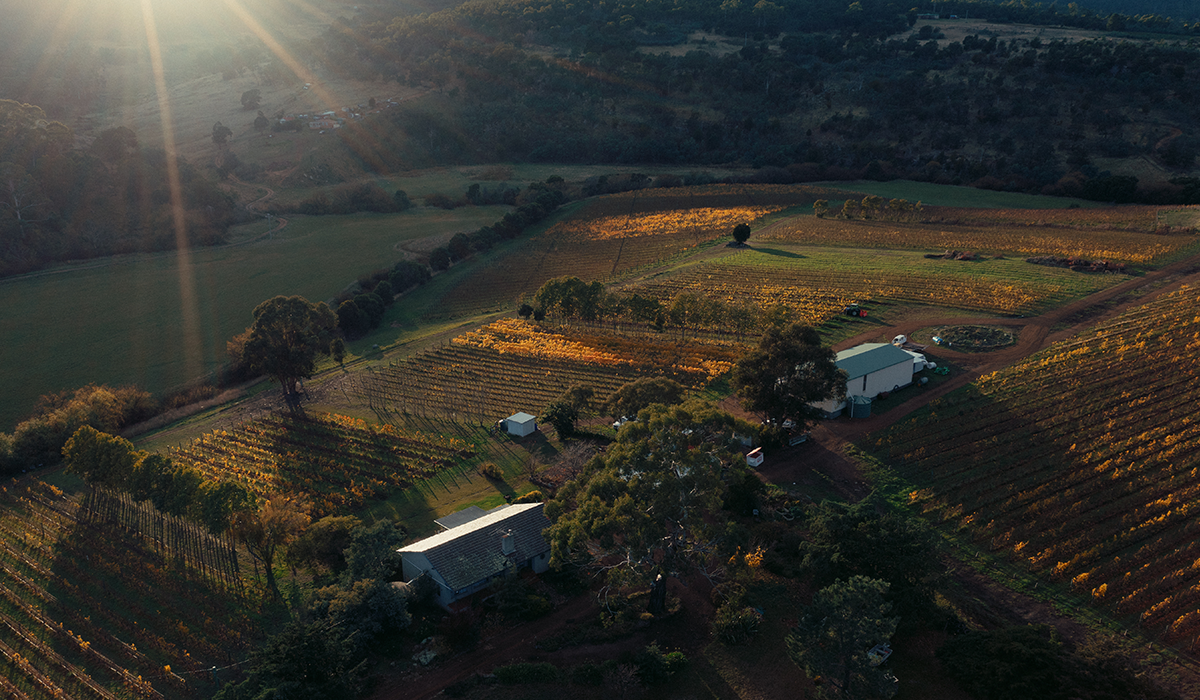
It’s clear that Hannah has found her ideal path among the vines. “You really can go to work for eight hours and come home and still want to talk about it all night,” she says. “It’s so unreal because in what other industry would you be able to do that? It’s so full of passionate people and there’s so much to learn – I don’t think you can ever stop learning and that’s really exciting.”
Pooley Wines is in the Coal River Valley, just outside Hobart. Established by Denis and Margaret Pooley in 1985, today the winery is helmed by their son John, along with winemaker granddaughter Anna Pooley and her winemaker husband Justin Bubb, Anna’s brother Matt and his wife Shelley. The winery has gone from strength to strength, collecting a range of accolades in recent times, including Winery of the Year in the 2023 Halliday Wine Companion Awards, and Riesling of the Year in the 2022 Halliday Wine Companion Awards. Hannah herself was nominated for Viticulturist of the Year in the 2023 Awards.
Pooley is a world away from Margaret River, which is so often regaled as having one of the most consistent climates of all Australian wine regions. “I’ve learned a lot very quickly,” Hannah says of the differences. “The biggest thing for me is not necessarily the cold, but the water. The rainfall here is so low – we average about 450 millimetres a year, compared to Margs, which gets over one metre. The soils are really shallow here, too, so they dry out quickly. If you don’t water for five days, you get defoliation.”
That raises concerns over water security, so Hannah and the team are working with the soils to improve their water-holding capacity. “We’re converting to organics, using more biological products such as our homemade compost, and improving biodiversity and site ecology by planting Australian native insectary species around the vineyard,” she says. This is in addition to their designated native vegetation sites among the vines, and use of cover crops, green manure and ground cover, which are all helping to build soil health.
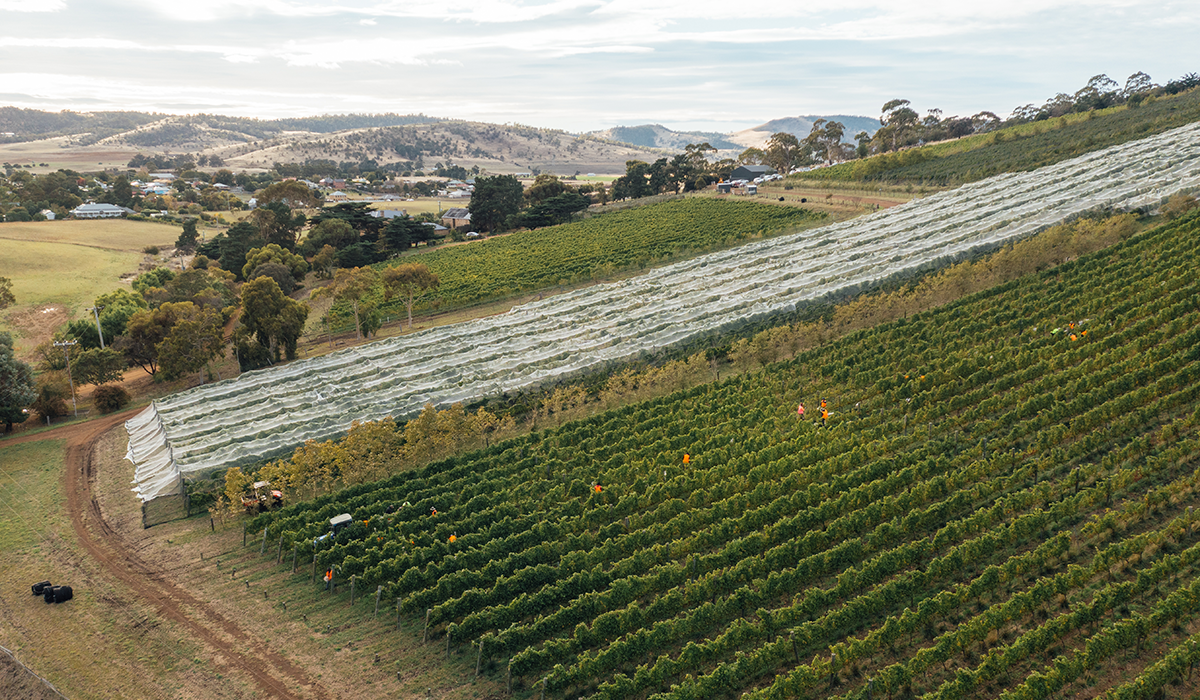
One good thing about that low rainfall, however, is the fact Hannah no longer gets drenched while in the vines. “It’s very different here. Last winter it snowed, which hadn’t happened here in about five years, and it’s amazing when it does,” she says. “In Margaret River, it buckets down all winter, and I’d prefer to be cold than wet. Because we have a drier winter, the mornings start with frost and then we get beautiful clear days. In summer it feels a lot warmer with a thinner ozone layer here, but island life always provides curveballs. As they say in Tassie, if you're not happy with the weather, wait 10 minutes.”
Those frosts can still wreak havoc, though. To combat that potential damage, overhead sprinklers are stationed in their frost-prone sites. They rotate and distribute water on the vines, which coats them with water that freezes. “This keeps the internal temperature of the vines warmer than the external and, as it defrosts, it protects them.”
Working across Pooley’s two vineyard sites offers a lot of variation for Hannah. While just 14 kilometres apart, the vineyards are distinctly different. Butcher’s Hill in Richmond is north-facing and windy, but has long sunshine days, and soils that are a little deeper and darker that retain more heat and moisture. Cooinda Vale in Campania, meanwhile, is nestled among hills and protected, but it’s also a lot colder as it’s much higher in altitude than the Richmond site. The Pooleys also recently acquired a third site next to Cooinda Vale, which is being planted out in stages.
“We grow chardonnay, pinot noir, riesling, pinot grigio and shiraz,” Hannah says. “We did have cabernet and merlot, but decided they weren’t going to be a big part of our future and couldn't compete with the quality coming out of Margaret River.” As a result, they have since planted more chardonnay, riesling, pinot and “a lot more shiraz”. The team is also experimenting with various clones across the varieties, and even have some nebbiolo in, thanks to Justin, who made wine in Italy for 10 years and has his Italian range, Babo.
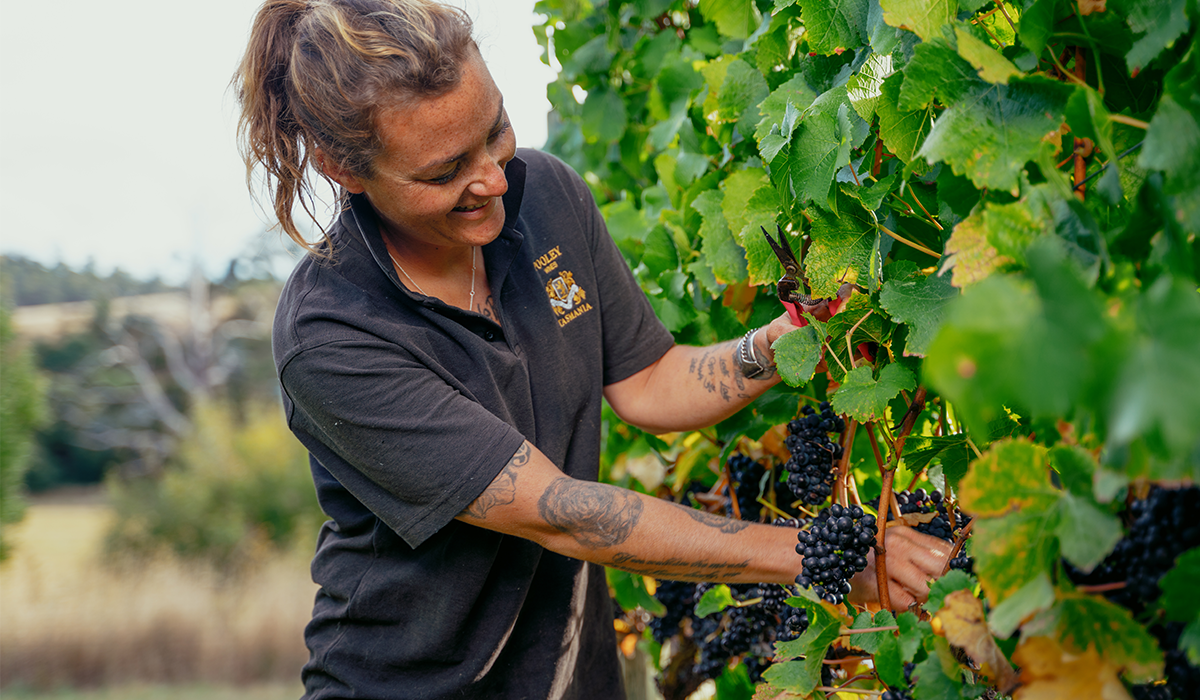
Together with her small team, Hannah is still getting used to the various challenges specific to their sites. “Powdery mildew and botrytis are the two main threats,” she says. “But through canopy management, bunch spacing, air flow and those sorts of things, you can keep the vines healthy. It’s about getting a system that works for you rather than you working for it. It’s a fun balancing act.”
Now gearing up for her third vintage at Pooley, Hannah is excited about what’s to come, having seen improvements in her short time. “2020 was a great vintage, and 2021 was just so perfect. I’d never seen a cleaner vineyard,” she says. When it comes to the range of wines, Hannah says the Cooinda Vale Chardonnay is a favourite. “It’s pristine, floral and with delicate nuances, but still very complex. It has lots of layers.”
Despite her love for wine, Hannah doesn’t harbour any desires to try her hand at making it. “I’m very much a grower,” she says.
“I appreciate and respect the winemaking, but I’m all about the vineyard and working with the land. It’s where my passion lies and what feels weirdly innate to me.
“There has been a dim light over viticulture over the decades and we don’t expect a red carpet. We simply love what we do and want to share the stories of the vine and the land in every bottle to reflect each unique vintage.”
Sign up to view these tasting notes and ratings
By becoming a member of Wine Companion, you'll have access to the largest database of wines in Australia.
This article first appeared in issue #63 of Halliday magazine. Become a member to receive the print publication as well as digital access.
Latest Articles
-
Win
Win a stunning collection of Plumm glassware and wine, valued at over $500
1 day ago -
Wine Lists
Top Christmas wines under $30 (and five worth splurging on)
2 days ago -
Wine Lists
Why you should drink Australian this festive season (and 80 of our best wines to try)
2 days ago -
From the tasting team
The Aussie wines the Halliday Tasting Team will be opening this festive season
2 days ago
